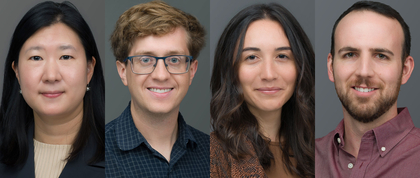
The NYU School of Global Public Health added four new faculty members for the 2025-2026 academic year. The faculty continue NYU GPH’s commitment to innovative research and teaching excellence and bring expertise in cardiovascular disease epidemiology, bioethics, and global and environmental health.
Yun Soo Hong is an assistant professor of epidemiology. Dr. Hong's research focuses on cardiovascular disease epidemiology, integrating genetics, multi-omics, and environmental exposures to identify novel determinants of cardiometabolic health. She leverages large-scale population-based cohort studies, including the UK Biobank, the All of Us Research Program, the Trans-Omics for Precision Medicine (TOPMed), and the Atherosclerosis Risk in Communities (ARIC) Study, to address critical questions in cardiovascular disease epidemiology and prevention.
Abrania Marrero is a clinical assistant professor of global and environmental health. Her research investigates human and global environmental changes in small island food systems, including the impacts of political economic shifts and climatic shocks on nutrition and cardiometabolic disease. Dr. Marrero is a former consultant for the Environmental Defense Fund and the Columbia Center on Sustainable Investment and, in her training, has served as an Agent of Change in Environmental Justice in the Mailman School of Public Health at Columbia University as well as a bench scientist with the USDA Agricultural Research Service.
Austen McDougal is an assistant professor/faculty fellow of bioethics. He works on the ethics and moral psychology of the heart. His views in ethical theory follow an age-old thread that says ethics is fundamentally, albeit not exclusively, about your motives. A number of his recent projects explore the grounds for more compassionate ways of being oriented toward others: for showing attention, grace, and love even when these might not be deserved.
Z Quanbeck is an assistant professor/faculty fellow of bioethics. His research lies at the intersection of ethics, epistemology, and 19th-century philosophy, focusing specifically on the ethics of belief. One part of his research aims to explain why what we believe about other people matters morally in interpersonal, political, and clinical contexts. A second component of his research develops an account of how evidential and practical considerations interact to determine what we ought to believe, when we ought to inquire, and which emotions we ought to have.